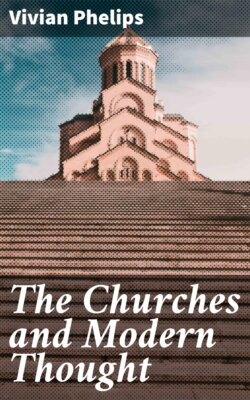Читать книгу The Churches and Modern Thought - Vivian Phelips - Страница 23
На сайте Литреса книга снята с продажи.
THE ASCENSION.
ОглавлениеIf apologetics dealing with the Resurrection are unconvincing, still more so are those regarding the Ascension. There is little or no attempt to explain the meagreness of the Gospel narratives, how all mention of it is omitted in the Gospels of St. Matthew and St. John; and one vague sentence is all we are given in St. Mark and St. Luke—sentences which, according to the Higher Critics, were never penned by these persons. In “The Acts” the “St. Luke” writer furnishes the detail that “a cloud received him out of their sight,” and that, “as He went up, behold, two men stood by them in white apparel, which also said, Ye men of Galilee, why stand ye gazing up into heaven? This same Jesus, which is taken up from you into heaven, shall so come in like manner as ye have seen Him go into heaven.” In these days “ascending up” has no meaning for us. Candidly, if the writer had had our astronomical knowledge, would these words ever have been written? Certainly they would not. Then is the Ascension a fact or is it not? How is it possible that St. Matthew and St. John could have remained silent regarding such an event if they had really witnessed it? Or granting, in the case of the writer of “St. John,” that he was not St. John the Apostle, though he distinctly says he was, it is still astounding that he should have omitted to record such important evidence of Christ’s divinity, if it was an accepted fact at the time he wrote.
Archdeacon Wilson, in a paper read at the Diocesan Conference at Manchester, October 22nd, 1903, asks: “What do we mean in our Creed when we say: ‘He came down from heaven’? We explain away ‘down,’ we explain away ‘heaven’ in the sense in which the word was originally used. What do we mean by ‘descended into Hell’? by ‘Sitteth on the right hand of God’? … Spiritual truths are spiritually discerned, and do not admit of final intellectual definitions. We can only avert the rejection of theology by recognising its limitations.” Is it possible for the bulk of humanity, I ask, to possess the requisite spiritual discernment? Is it not far more likely that, with the spread of education, they will finally reject theology?
The Rev. David Smith, in his book, The Days of His Flesh,19 dismisses the Ascension with the words: “When Jesus parted from the eleven on Olivet, He did not forsake the earth and migrate to a distant Heaven. He ceased to manifest Himself; but He is here at this hour no otherwise than during those forty days.” One can but wonder how Ascension Day is kept in Mr. Smith’s church, and how he brings himself to repeat the Apostles’ Creed.
Leaving aside the thoroughly unreliable nature of the Bible accounts of the Ascension, consider how easy it is for the superstitious, through optical illusions or subjective visions (or whatever name it may please the neologist to give to these “experiences”), to be honestly convinced of the occurrence of a supernatural event, and to take care that it should lose nothing of its marvellous character in the telling. Only the other day the good people of Sudja saw a mighty iris-coloured cross appear over the cathedral during divine service, and regarded the phenomenon as a sign of heaven’s resolve to bestow victory upon Christian Russia. This “miracle” was witnessed by all the notabilities of the city, who forwarded a description to General Kuropatkin in a document duly attested with their signatures. For the stupendous and absurdly impossible miracle of the Ascension we have not even got a satisfactory description, much less an attested document. Is it not time that we should ask ourselves the plain question, Do we really believe that an extraordinary levitation occurred, and that Jesus Christ was seen to be rising in the air until some passing clouds concealed Him from view? If we do not so believe, why do we say we do when we repeat the Creed? Why do we pretend we do when we sit in church and listen to the account of the Ascension, and perhaps to a sermon on it? Why do we allow our friends to think that we do so believe? Why is Ascension Day one of our Holy Days? And, finally, why do we teach, or allow others to teach, our children what we know to be untrue? Surely these are serious questions to ask ourselves.
